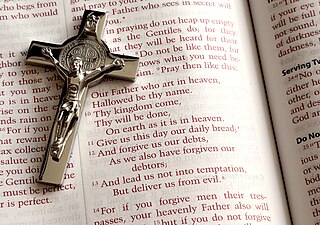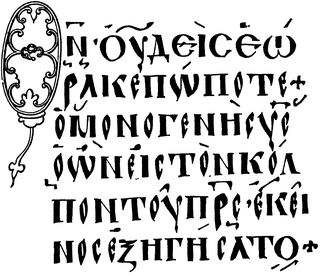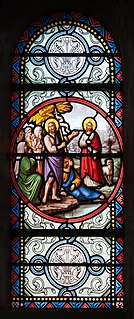Related Research Articles

Unconditional election is a Reformed doctrine relating to predestination that describes the actions and motives of God prior to his creation of the world, when he predestined some people to receive salvation, the elect, and the rest he left to continue in their sins and receive the just punishment, eternal damnation, for their transgressions of God's law as outlined in the Old and New Testaments of the Bible. God made these choices according to his own purposes apart from any conditions or qualities related to those persons.
Absolution is a traditional theological term for the forgiveness imparted by ordained Christian priests and experienced by Christian penitents. It is a universal feature of the historic churches of Christendom, although the theology and the practice of absolution vary between denominations.

Matthew 6:14–15 are the fourteenth and fifteenth verses of the sixth chapter of the Gospel of Matthew in the New Testament and is part of the Sermon on the Mount. These verses come just after the Lord's Prayer and explain one of the statements in that prayer.

A Christian child's prayer is Christian prayer recited primarily by children that is typically short, rhyming, or has a memorable tune. It is usually said before bedtime, to give thanks for a meal, or as a nursery rhyme. Many of these prayers are either quotes from the Bible, or set traditional texts.

Matthew 8:4 is the fourth verse of the eighth chapter of the Gospel of Matthew in the New Testament. This verse concludes the miracle story of Jesus cleansing a leper, the first of a series of miracles in Matthew.
Matthew 9:2 is a verse in the ninth chapter of the Gospel of Matthew in the New Testament.
Matthew 9:3 is a verse in the ninth chapter of the Gospel of Matthew in the New Testament.
Matthew 9:5 is a verse in the ninth chapter of the Gospel of Matthew in the New Testament.
Matthew 9:4 is a verse in the ninth chapter of the Gospel of Matthew in the New Testament.
Matthew 9:14 is a verse in the ninth chapter of the Gospel of Matthew in the New Testament.
Redemptive suffering is the Catholic belief that human suffering, when accepted and offered up in union with the Passion of Jesus, can remit the just punishment for one's sins or for the sins of another, or for the other physical or spiritual needs of oneself or another. Pope John Paul II stated, "Each man, in his sufferings, can also become a sharer in the redemptive suffering of Christ". Like an indulgence, redemptive suffering does not gain the individual forgiveness for their sin; forgiveness results from God’s grace, freely given through Christ, which cannot be earned.(See Romans 4:3-5) After one's sins are forgiven, the individual's suffering can reduce the penalty due for sin.

"John the Revelator" is a traditional gospel blues call and response song. Music critic Thomas Ward describes it as "one of the most powerful songs in all of pre-war acoustic music ... [which] has been hugely influential to blues performers". American gospel-blues musician Blind Willie Johnson recorded "John the Revelator" in 1930 and subsequently a variety of artists have recorded their renditions of the song, often with variations in the verses and music.
The usual beginning is the series of prayers with which most Divine Services begin in the Eastern Orthodox Church and those Eastern Catholic Churches which follow the Byzantine Rite.
Absolution of the dead is a prayer for or a declaration of absolution of a dead person's sins that takes place at the person's religious funeral.

Healing the paralytic at Capernaum is one of the miracles of Jesus in the Gospels in Matthew (9:1–8), Mark (2:1–12), and Luke (5:17–26). Jesus was living in Capernaum and teaching the people there, and on one occasion the people gathered in such large numbers that there was no room left inside the house where he was teaching, not even outside the door. Some men came carrying a paralyzed man but could not get inside, so they made an opening in the roof above Jesus and then lowered the man down. When Jesus saw their faith, he said to the paralyzed man, "Son, your sins are forgiven."

John 1:18 is the eighteenth verse in the first chapter of the Gospel of John in the New Testament of the Christian Bible.

John 1:29 is the twenty-ninth verse in the first chapter of the Gospel of John in the New Testament of the Christian Bible.

John 1:26 is the twenty-sixth verse in the first chapter of the Gospel of John in the New Testament of the Christian Bible.

John 1:39 is the 39th verse in the first chapter of the Gospel of John in the New Testament of the Christian Bible.
References
- ↑ Cornelius Cornelii a Lapide; Thomas Wimberly Mossman The great commentary of Cornelius à Lapide, London: J. Hodges, 1889-1896.
- ↑ Robert Witham, Annotations on the New Testament of Jesus Christ. Dublin: 1730.
- ↑ John MacEvilly, An Exposition of the Gospel of St. John consisting of an analysis of each chapter and of a Commentary critical, exegetical, doctrinal and moral, Dublin Gill & Son 1879.
- 1 2 3 4 5 6 7 8 9 10 11 12 13 "Catena aurea: commentary on the four Gospels, collected out of the works of the Fathers: Volume 6, St. John. Oxford: Parker, 1874. Thomas Aquinas".
 This article incorporates text from this source, which is in the public domain.
This article incorporates text from this source, which is in the public domain.